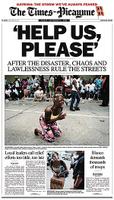 [[P O L I T I C S]] * In the “reality-based community,” events on the ground tend to overwhelm ideological agendas. And so it is with Hurricane Katrina. The Bush White House and the GOP-controlled Congress had hoped to spend this fall resuscitating the prez’s unpopular scheme to undermine Social Security, confirm Judge John Roberts to the U.S. Supreme Court, and emphasize “tax reform.” But, while Republican National Committee chairman Ken Mehlman continues to trumpet the supposedly crying need to eliminate the estate tax (currently scheduled to be phased out in 2010, only to return in 2011), politicians with beating hearts tend to be more focused right now on the need for relief in battered New Orleans and the rest of America’s Gulf Coast, as well as plans to handle this disaster’s economic fallout. (There are already estimates that Katrina could cost 500,000 Americans their jobs in September.)
[[P O L I T I C S]] * In the “reality-based community,” events on the ground tend to overwhelm ideological agendas. And so it is with Hurricane Katrina. The Bush White House and the GOP-controlled Congress had hoped to spend this fall resuscitating the prez’s unpopular scheme to undermine Social Security, confirm Judge John Roberts to the U.S. Supreme Court, and emphasize “tax reform.” But, while Republican National Committee chairman Ken Mehlman continues to trumpet the supposedly crying need to eliminate the estate tax (currently scheduled to be phased out in 2010, only to return in 2011), politicians with beating hearts tend to be more focused right now on the need for relief in battered New Orleans and the rest of America’s Gulf Coast, as well as plans to handle this disaster’s economic fallout. (There are already estimates that Katrina could cost 500,000 Americans their jobs in September.)Polls reveal just how wide is the disconnect between the priorities of the general public and those of the GOP. With gas prices skyrocketing and supplies threatened by the hurricane devastation, a new AP-Ipsos survey found 24 percent of respondents listing fuel expenses as their foremost concern, second only to the Iraq war (at 29 percent). The economy and jobs rounded out their four chief concerns. (Note to Ken: The estate tax didn’t make the cut of voter priorities.) This is the first time in years that oil and gas prices have created such anxiety. A CBS News poll produced similar results, with 86 percent of those questioned saying they expect the cost of gas to continue climbing in the Katrina aftermath. The CBS study also showed that 57 percent of Americans believe George W. Bush is sugarcoating the news coming out of Iraq, and only 41 percent of respondents approved of the prez’s overall performance in office--a 4 percent drop from early August. Interestingly, for those who remember how President George H.W. Bush was roundly criticized for his feeble response to Hurricane Andrew back in the fall of 1992, the CBS poll shows 54 percent approving of the way Bush II is handling the Katrina disaster, while “nearly two thirds” approved of how his father dealt with Andrew.
While the current Bush’s Democratic opponents don’t want to look as if they’re politicizing this catastrophe, they’re nonetheless moving to pass legislation they insist will help Katrina survivors. U.S. Representative John Conyers of Michigan, the ranking Democrat on the House Judiciary Committee, is expected later this week to introduce bills “explicitly giving the federal government authority to pursue [gas] price gouging actions” and amending the U.S. Bankruptcy Code (which Congress “reformed” last year, making it more difficult for debtors to declare bankruptcy) in order that the “most onerous provisions of the new law, scheduled to take effect October 17, do not inflict damage on the millions of victims of Hurricane Katrina and their families.” And earlier in the week, U.S. Senate Minority Leader Harry Reid (D-Nevada) dispatched a letter to his Republican counterpart, Bill Frist of Tennessee, asking that estate-tax repeal legislation and other less essential agenda items be taken off the table as Congress reconvenes after its summer recess, in order to concentrate on hurricane recovery strategies. “Given the tragic and devastating events along the Gulf Coast,” Reid wrote, “members of the Senate would have great difficulty explaining why we were debating the estate tax during our first days back when we know hundreds of thousands of families are suffering.”
 Bush is seeing for himself some of that suffering today, as he wings in relative comfort around the region--four days after Katrina did its worst. There’s been widespread criticism of the prez’s sluggish reaction to this domestic hurricane, especially compared with the massive amounts of money and manpower poured into Iraq. The Bush administration’s decision to cut New Orleans flood-control funding by 44 percent to free up dollars for the Iraq war has been blasted, and New Orleans Mayor Ray Nagin told listeners to a Crescent City radio station yesterday that federal officials “don’t have a clue what’s going on down here.” Even Bush’s seemingly compassionate visit to Louisiana, Mississippi, and Alabama has resulted in headshaking and catcalls. This is partly because he seemed out of touch (again) with realities on the ground, partly because he fell back on his traditional fondness for platitudes (“We have a responsibility to clean up this mess”; “We are going to restore order in the city of New Orleans”), but also as a result of such tone-deaf, insensitive statements as this one, which the prez made during a stop today in Mobile, Alabama: “The good news is that out of this chaos is going to come a fantastic Gulf Coast, like it was before. Out of the rubble of [Senator] Trent Lott’s [Pascagoula, Mississippi] house--he’s lost his entire house--there’s going to be a fantastic house. And I’m looking forward to sitting on the porch.” As Salon’s War Room notes, “There was laughter as the president spoke ... but probably not so much among the mostly African-American victims still waiting for help in New Orleans. It was Trent Lott, after all, who once observed that America would have been better off if it had elected segregationist Strom Thurmond to the White House in 1948.”
Bush is seeing for himself some of that suffering today, as he wings in relative comfort around the region--four days after Katrina did its worst. There’s been widespread criticism of the prez’s sluggish reaction to this domestic hurricane, especially compared with the massive amounts of money and manpower poured into Iraq. The Bush administration’s decision to cut New Orleans flood-control funding by 44 percent to free up dollars for the Iraq war has been blasted, and New Orleans Mayor Ray Nagin told listeners to a Crescent City radio station yesterday that federal officials “don’t have a clue what’s going on down here.” Even Bush’s seemingly compassionate visit to Louisiana, Mississippi, and Alabama has resulted in headshaking and catcalls. This is partly because he seemed out of touch (again) with realities on the ground, partly because he fell back on his traditional fondness for platitudes (“We have a responsibility to clean up this mess”; “We are going to restore order in the city of New Orleans”), but also as a result of such tone-deaf, insensitive statements as this one, which the prez made during a stop today in Mobile, Alabama: “The good news is that out of this chaos is going to come a fantastic Gulf Coast, like it was before. Out of the rubble of [Senator] Trent Lott’s [Pascagoula, Mississippi] house--he’s lost his entire house--there’s going to be a fantastic house. And I’m looking forward to sitting on the porch.” As Salon’s War Room notes, “There was laughter as the president spoke ... but probably not so much among the mostly African-American victims still waiting for help in New Orleans. It was Trent Lott, after all, who once observed that America would have been better off if it had elected segregationist Strom Thurmond to the White House in 1948.”Given the federal government’s indolent response to the food, water, safety, and transportation needs of beleaguered New Orleanians and others across the Gulf Coast, it’s inevitable that questions should be raised about how prepared U.S. cities are in the event of a conceivably worst disaster, such as a nuclear or biological terrorist attack. Meanwhile, people around the world are expressing shock at the damage left in Katrina’s wake, as well as the looting, violence, and tardy rescue campaigns that have followed in the hurricane’s path. “Anarchy in the USA,” declared a headline in Britain’s Sun newspaper. The French daily Libération wrote: “A modern metropolis sinking in water and into anarchy--it is a really cruel spectacle for a champion of security like Bush.”
Salon columnist Joe Conason hopes that, as the National Guard finally launches its recovery efforts, and as emergency-response failures to Katrina’s devastation are assessed, Americans will demand of their representatives on Capitol Hill, in the White House, and elsewhere some honest, nonpartisan debate about how this mess came about in the first place. But he fears that politicians will try to lay responsibility off on others, or bury fault in favor of a convenient national comity--especially if it appears that the Bush administration and its water-carriers in Congress deserve substantial blame for what’s happened over the last few days. “Neither bullying bluster nor banal pieties,” Conason writes, “can deter candid debate about federal emergency planning and funding, the underlying causes of harsher hurricanes over the past few decades, and the crippling domestic costs of an expensive, unnecessary foreign war. The right’s capacity to intimidate has been much diminished by the proven lies and failures of this administration. We are likely to face still more fearsome challenges, from natural disasters and human enemies, in the months and years to come. The governing style and habitual dishonesty of the Bush Republicans represent a severe danger to our future well-being. Nobody should be afraid to say so.”
As the South digs out of its deluge, we will see just how honest, able, and compassionate Americans can be. Let’s hope we measure up to our own expectations.
ADDENDUM I: So, have you been wondering where Dick Cheney has been during one of the United States’ worst natural disasters? For once, the answer is not “an undisclosed location.” Instead, AMERICAblog reports, Cheney remains peacefully on vacation at his home outside of Jackson, Wyoming! There’s no “date certain” yet for his return to the nation’s capital. I guess that, unlike Bill Clinton and Bush Sr., George W. has nothing for Cheney to do.
ADDENDUM II: The Washington Post’s “Security Fix” columnist, Brian Krebs, has been collecting lists of Web sites that are trying to bilk good-hearted folks out of donations intended for Hurricane Katrina relief. To learn more, start by checking out “Scammers Hit Web in Katrina’s Wake,” then click here and here.
READ MORE: “Editorial: Yes, We’re Worth It” (The Times-Picayune); “Why Katrina Is Likely to Be a Disaster for President Bush, Too,” by Ted Widmer (History News Network); “Bush Seen as Doing Too Little, Too Late,” by Richard Luscombe (The Guardian); “Bush’s Role in the Drowning of New Orleans,” by Van Jones (The Huffington Post); “Flushing Out the Ugly Truth,” by Joan Walsh (Salon); “Halliburton Gets Katrina Contract, Hires Former FEMA Director” (Halliburton Watch); “Democrats and Others Criticize White House’s Response to Disaster,” by Elisabeth Bumiller (The New York Times); “Inside New Orleans,” by Kathryn Jezer-Morton and Gray Miles (Salon); “Miracle Worker,” by Bruce Reed (Slate); “Specialists Warn of Health Disaster,” by Scott Allen (The Boston Globe); “Ray Nagin: Mayor on the Verge of a Nervous Breakdown,” by Josh Levin (Slate); “Bush Strafes New Orleans--Where Is Huey Long?,” by Greg Palast; “Department of Homeland Screw-up,” by Tim Naftali (Slate); “How FDR Handled the Fallout from the Great Labor Day Hurricane of 1935,” by Willie Drye (History News Network).







No comments:
Post a Comment